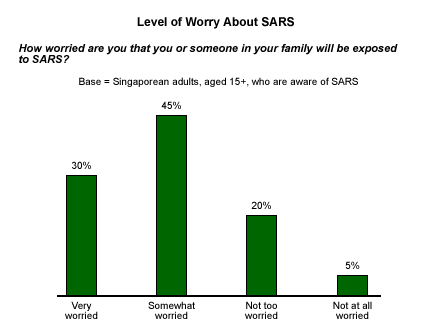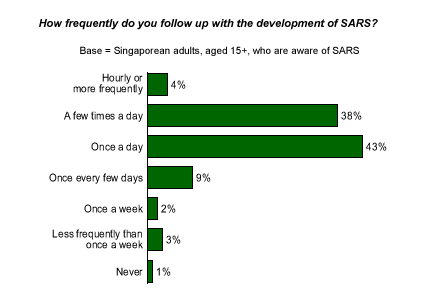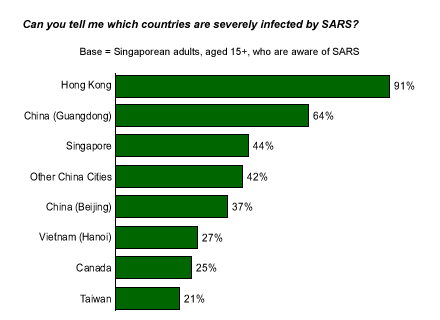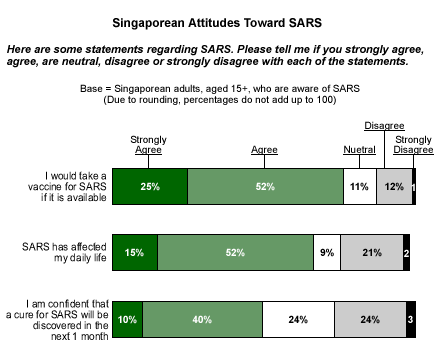According to a nationwide Gallup Poll of Singaporeans conducted last week*, three in four residents of that country (75%) are "very" or "somewhat" worried that either they or a family member will be exposed to severe acute respiratory syndrome (SARS), the virulent virus that has been spreading throughout the world over the past few months. The virus, which is believed to have originated in southern China, has so far killed six people in Singapore and infected more than 100.
In comparison, although the actual number of SARS cases in the United States (115) is higher than in Singapore, Americans are not as worried as Singaporeans. Thirty-seven percent of Americans are very or somewhat worried that they or a family member will be exposed to SARS.

Perhaps the most striking finding from this survey is the near-universal awareness of SARS among residents of Singapore. Virtually all respondents to the survey expressed awareness of SARS (99%), with most saying that they learned about the disease from television and newspapers. Most Singaporeans are following news about the disease very closely, with 85% seeking information at least once a day and 4 in 10 (38%) following developments more than once a day.

Transmission and Containment of SARS
Most Singaporeans are knowledgeable about how SARS is being transmitted, as well as the symptoms associated with it. A quarter (25%) of those interviewed believe SARS is transmitted through the air. When asked which countries are severely infected by SARS, 9 in 10 (91%) named Hong Kong, which was perceived to be more highly infected than the Guangdong province of China (64%), even though incidence rates in the latter area were higher at the time of interviewing.

The government of Singapore receives a high level of support for the measures that have been taken to contain SARS, with 83% indicating satisfaction with the government and only 5% saying they are dissatisfied. Eighty-three percent of the Singaporean public also agrees that the measures taken by the government to contain SARS are timely, while three in four (76%) are confident in the government's ability to stop an outbreak of the disease.
Singaporeans feel that enforcing strict disinfecting routines in public places/transport and setting up temporary health units for the public are among the most effective methods for containing SARS. Eighty-eight percent of the public agrees that the former measure is needed, and 81% supports the latter measure. Seven in 10 (73%) indicate support for extending the school closure period, an action that the Ministry of Education in Singapore did take subsequent to the completion of this poll.
Recent editorials in the Singaporean press have called for a "total shutdown" approach for air travel, banning travel into and out of Singapore. A majority of Singaporeans agree that banning flights to and from severely infected regions is needed to stop SARS from spreading. Sixty-one percent of Singaporeans support banning flights from infected regions into Singapore, and 63% support banning flights to severely infected regions.
Personal and Economic Impact of SARS
The personal impact of SARS is widespread, with nearly 7 in 10 (67%) Singapore residents indicating that the disease has affected their daily lives. Eighty-four percent indicate that they have taken some form of precaution against contracting the disease, with half (51%) mentioning that they are avoiding or minimizing visits to crowded public places. A sizable percentage (77%) indicates that it would take a vaccine for SARS if available. Only 50% of the population was confident that a cure for SARS would be discovered in the next month.

In the wake of this outbreak, economists have begun to revise economic growth figures downward for countries affected by SARS. Three in four Singaporeans (73%) believe that SARS has affected the economy to a large extent. Eighty-four percent believe tourism in Singapore has been affected.
*The Gallup Poll on SARS was conducted on April 2-3, 2003, among a random sample of 512 Singaporean citizens and permanent residents, aged 15 years and older. The maximum sampling error for this study is ±4.3% at a 95% confidence level. Interviewing was conducted face-to-face.